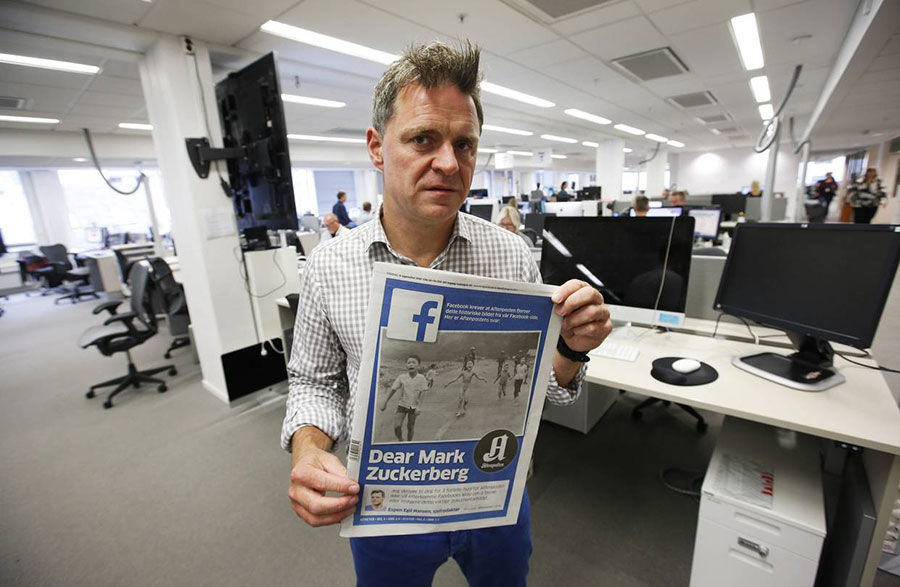-
Tips for becoming a good boxer - November 6, 2020
-
7 expert tips for making your hens night a memorable one - November 6, 2020
-
5 reasons to host your Christmas party on a cruise boat - November 6, 2020
-
What to do when you’re charged with a crime - November 6, 2020
-
Should you get one or multiple dogs? Here’s all you need to know - November 3, 2020
-
A Guide: How to Build Your Very Own Magic Mirror - February 14, 2019
-
Our Top Inspirational Baseball Stars - November 24, 2018
-
Five Tech Tools That Will Help You Turn Your Blog into a Business - November 24, 2018
-
How to Indulge on Vacation without Expanding Your Waist - November 9, 2018
-
5 Strategies for Businesses to Appeal to Today’s Increasingly Mobile-Crazed Customers - November 9, 2018
Facebook Slammed for Censoring Iconic Vietnam War Photo Over Nudity
Erna Solberg, Norwegian Prime Minister, posted on her Facebook page the social media it is getting it wrong when they censor such images.
Advertisement
“We call on Facebook to add respect for the journalistic values of photos to these rules, and to ensure that their rules are never more severe than national legislations”.
Solberg posted the iconic “Napalm Girl” news photograph on her Facebook page after the company had deleted it from sites of Norwegian authors and the daily Aftenposten.
But later on, Facebook analyzed the situation, and a company spokesperson stated that an image of a naked child would normally be presumed to violate their policies, and in some countries might even qualify as child pornography.
Her post was taken down several hours later, deleted by Facebook, she said.
Protesting Facebook’s move, Solberg re-posted the photo with a black square covering the naked girl, and published a range of other historic images blacking over faces of people such as Ronald Reagan or Winston Churchill.
CEO Mark Zuckerberg was accused of “abusing his power” by the editor of Norway’s biggest newspaper after Facebook deleted an article containing the 1972 image of nine-year-old Kim Phuc running down the street without any clothes on after sustaining severe burns in a napalm attack. Facebook usually does not proactively remove photos, with some exceptions, such as child pornography.
The attack comes after Facebook recently fired the team of editors who managed the trending topics section and replaced them with algorithms – which then swiftly proved the difficulty of automating news editorial judgment by promoting a fake news story.
In an email to the newspaper, a Facebook spokeswoman said that while they recognised the image was iconic, it was hard to distinguish between cases where naked pictures of children should be allowed, and when they should not be.
Free and independent media must sometimes publish unpleasant images, he said. “We try to find the right balance between enabling people to express themselves while maintaining a safe and respectful experience for our global community”, it said. When Aftenposten subsequently reported on the suspension – with the same image on its article – the newspaper was asked by Facebook to “either remove or pixelise” the photograph.
“Our solutions will not always be ideal, but we strive to further improve our policies and the way we enforce them”.
Facebook chose to reverse its decision Friday after it “listened to the community” and recognised the “global importance” of the photo.
In a statement to Fairfax Media, Facebook said it had “looked again at how our Community Standards were applied in this case”. Because of its status as an iconic image of historical importance, the value of permitting sharing outweighs the value of protecting the community by removal, so we have made a decision to reinstate the image on Facebook where we are aware it has been removed.
After the statement, Facebook said it would adjust its reviewing process on both software and human moderators to allow sharing the iconic picture.
It will take some time to adjust these systems but the photo should be available for sharing in the coming days. “Our solutions won’t always be flawless, but we will continue to try to improve our policies and the ways in which we apply them”.
Advertisement
Photos are often automatically removed if enough people report them. Ms Solberg had posted the picture in the name of freedom of expression amid a brewing debate in Norway.





























